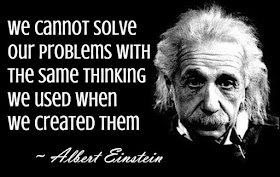I attended a very interesting lecture this evening, the
topic was “Where” is creativity, now what is creativity?
The lecturer began by pointing
to a painting and asking, “How many of you have looked at a work of art and
said, “How creative.”
He then pointed out the obvious flaw in that statement, the
inanimate object (be it a painting, a bronze or a book) cannot be creative, it
is the artist who is creative.
This struck me because I had several of my friends say to me,
“Your book is do creative!” And the little voice inside my head cried out, “I
created the story, the story did not create me!” (Fodder for a whole new blog!)
He went on to discuss how all creativity starts in the mind.
He defined creativity thusly: the ability to transcend
traditional ideas, rules, patterns, relationships, or the like, and to create
meaningful new ideas.
The first ax ever invented, basically a sharpened stone, some
millions of years ago, was a new idea, but what about the second? When someone
came up with the idea of attaching the stone to a wooden handle, was that a new
idea or a logical extension to a new idea?
Books are not new by any means, but if a story is published
that has not been told before, is that a new idea?
The idea of the stone ax, millions of years ago was the
creation of an idea, formed in the mind and translated into an actual tool.
The
invention of something that had never existed into a real implement.
What about the first cave painting? The difference here is
that the animals painted already existed. So, nothing new there, what was new
was the ability of that early artist to render what he saw into art.
A great deal of work and invention was invested just to
decorate the inside of a dark cave. They had to invent paint, a method to apply
that paint. They had to illuminate the cave in a way that would not darken the
ceiling, which they also painted, with soot. They invented scaffolding to reach
those high ceilings. These he termed technology.
But is not technology an act of the creative mind?
Einstein’s many discoveries, particularly relativity, was a
scientific first. He “Discovered” this through the use of mental images, then
to support his conclusions he learned to be a mathematician. His discovery, I contend,
was thus an act of creativity, and not relativity itself for it already
existed, he just brought it to the world’s attention.
The science already existed when Steve Jobs made his
breakthroughs, would anyone not call him creative?
I believe that all living human beings are capable of creative
thought. A great many who are not actually creative only lack the skill sets.
Perhaps there is another Einstein out there, who, through his weak math and science
knowledge is to timid to step forward.
Another Ayn Rand may be living next door to you, but because
she lacks education in proper writing, the correct use of the English language and
has not been motivated her talents, her stories, her voice go unheard.
Creativity has been the one thing that has allowed our
species to survive.
As the lecturer pointed out we had three things going against
us prehistoric times; we’re fragile, we’re weak, and we’re tasty.
My sites:









Thought provoking.
ReplyDeleteThe lecture was immensely so. I wish I had recorded it. I wrote it out, after the fact, as much as I could remember. I'm trying to contact the gentlemen and ask him if I can get a copy of his notes. I have a funny feeling he spoke extemporaneously.
ReplyDelete